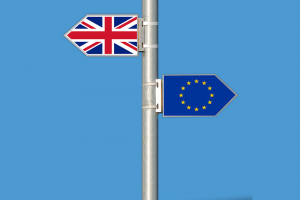Disclaimer: The views expressed in this article are the author’s and not necessarily those of TheSprout.
Brexit 2017
It was announced over a week ago that PM Theresa May will finally trigger Article 50 on the 29th March 2017 (today), starting the official proceedings of pulling the UK out of the European Union; this has never happened in the history of the EU. After the passing of the Brexit Bill, endorsed by both the House of Commons and the House of Lords, the next stage now will be for the UK to make new deals with the other 27 member states of the EU. However, there are still many unanswered questions about how Brexit will impact many key subjects; what would be the possible outcomes? Here are 9 things young Brits should be aware of in the present Brexit negotiations.
The Economy
One of the main arguments from the Bremainers in 2016 was that Brexit will have a devastating impact on the British economy. Most business and economic experts had said at the time that Brexit will be very bad for the UK. Nine months on, the fog has now been cleared from the 23rd June 2016 and the official research has been conducted by experts from both the UK and the European Union.
Firstly, we need to understand who will be in the worse position out of the two players. IMCO Committee researcher Michael Emerson quotes in his recent published study (An Assessment of the Economic Impact of Brexit on the EU27) “ Our main finding is that the available studies largely agree that Brexit will inflict losses on both sides. All studies agree that the losses will be considerably larger for the UK than for the EU27”. With the UK pulling out of the European Single Market it will likely lead to an economic black hole, basically meaning it will take decades for the UK to recover and to re-forge new trade deals with the EU, USA, China and India.
We are also seeing big UK businesses and banks starting to relocate to the main continent. London being the capital of stock exchange in Europe is now shifting over to Frankfurt in Germany; home to the European Central Bank (ECB). According to Bloomberg correspondents Gavin Finch and Simon Kennedy “Frankfurt expects as many as 10,000 workers from Britain’s financial services industry to relocate to Germany’s banking capital because of Brexit, with the exodus likely to start within weeks, according to lobby group Frankfurt Main Finance”.
So this is one of the first stages of Brexit and there will be more of this to come within the next few years; even way after the divorce settlement that will take place in 2019. So what about the British pound? The good news is for now the Pound is stable. But again, if the UK fails to secure a deal with the EU then Gary Howes from Sterling Live argues “In such a scenario, a reduction in Foreign Direct Investment could hit the economy and hurt Sterling given the large current account deficit the country runs. Without investment inflows demand for Sterling would be diminished and the Pound would have to fall further”.
Another important factor to take into account is that since the UK is going towards a “Hard Brexit”, the government cannot just walk away and just leave, as many of the Brexit-eers have claimed. The UK will legally have to pay for the big bill. British researcher Alex Barker from the Centre For European Reform states, “Britain’s EU exit bill is possibly the single biggest obstacle to a smooth Brexit. The European Commission calculates that the UK has €60 billion of charges to settle”.
He goes on explaining why this is the case, “The €60 billion covers Britain’s potential obligations in three main areas: legally binding budget commitments that will be paid after Britain leaves; pension promises to EU officials; and contingent liabilities – such as bailout loans to Ireland – that would only require payments in certain circumstances”.
This is of course a long-term debt repayment process and the EU will continue its surveillance in the UK after 2019. Ryan Heath explains “The UK will be stuck with financial monitoring by the EU until 2024 because EU-projects through to 2019 are subject to ex-post evaluations until 2024”. He then continues “The UK government has promised to guarantee funding beyond the point at which the UK leaves the EU, in respect of structural and investment projects where the UK bids directly on a competitive basis”. No matter how outraged Theresa May and other Brexit-eers are about this Brexit comes with consequences and responsibility.
 Laws & Rights
Laws & Rights
During the 43 years of EU membership, many of the laws and rights in the UK; like human rights, the environment, fisheries and agriculture, were all enforced in the agreed treaties by the European Union. Now Brexit is in process, an up-to-date source from Politico states about “20,833 EU laws and rules are to be scrutinized”. Basically it means the task of undertaking the paperwork in transferring EU law into domestic British law in the space of two years is just impossible! Not only just that, there are many things to consider.
Firstly, the big victims of Brexit will be the EU citizens living the UK. Politico states “among the 3.3 million EU27 citizens living in the UK, certain groups of people will be among the first to be affected by Brexit because they would no longer benefit from EU protections”. Also to consider the 125,000 EU students and the 15% of academic staff from UK universities will be heavily affected. They would have no choice but to leave the UK which will be a disaster for research and science.
Another terrifying aspect is the likely termination of the Workers Rights and the UK/EU Employment Law for all UK citizens. In a published 2016 briefing paper (Brexit: employment law) from the House of Commons Library, it states on page 3 “UK employment rights currently guaranteed by EU law would no longer be so guaranteed. In consequence, a post-Brexit government could seek to amend or remove any of these”. Then to conclude “some EU rights have direct effect, meaning that individuals can rely directly on EU law (for example the right to equal pay contained in the Treaty) – these rights would automatically cease to apply upon exit from the EU, absent any domestic legislation saving them, or new international obligation to maintain them”.
For anyone who thought a zero hour contract job was bad enough? This is much worse than we originally anticipated. It will mean unfair wages and growing gap in inequality in the public and private sectors.
Jobs & Employment
Brexit will likely make 2017 very gloomy for the job market when thousands of jobs are now leaving the UK. Fortunately, according to the UK trading economics statistics, the unemployment rate is 4.7% the lowest since 2005. However, with Brexit looming there will be even more competition for jobs now and this will increase problems for young adults striving to find jobs across the UK. The only pragmatic option for young people to find work is to move to the big cities like London which has become very expensive to live. To survive in London now as an individual, one would need to earn an equivalent of £40K per year to afford the rent, bills, tax, transport, food and social life. The future of London in Brexit UK will make young people struggle even more.
Travelling Abroad
I for one love travelling. It is one of the best things to do as a young adult. It was only last year that I went on a interrail trip around Europe (thanks to having a British EU passport) and it was one of the best summers of my life. However, after the Brexit vote in June 2016, I knew it was going to remove all those privileges like cheap transport, access to immediate health insurance, not paying mobile roaming fees and more. The people who are going to suffer this are my UK friends who don’t have entitlement to other EU nationality. With Brexit, there will be the return of strict passport control involving endless queuing; my old folks remember those days before 1973 and they say it was awful during that time. There will be an introduction of visas like in the US system. Plus for the young UK adult, travelling is going to become a very very expensive investment.
Future of Wales
How can Wales/ Cardiff survive in a Brexit UK?
The honest answer to that question is in the long run, it is still very unpredictable because no one actually knows yet! At the moment, Wales has secured a huge amount of funding from the EU Horizon 2020 that is worth altogether £3 Billion (2014-2020) that goes towards supporting agriculture, research, climate change, heritage and more in Wales. So for now Wales is stable, but after 2020 that can all change.
Could Wales opt for independence from the UK?
The honest answer is no, it is very unlikely to happen. Plaid Cymru who are a pro-European party, had initiated the prospect of Welsh independence after the Brexit vote just like the Scottish National Party in Scotland, because they want remain in the EU Single Market. But after Brexit Day, according to the BBC statistics, Wales voted an overwhelming “52.5% for Brexit” so that puts Wales in a very difficult position. Firstly, once the UK officially leaves the European Union in 2019, Wales will most likely not receive a single penny from Brussels to continue the current projects in Cardiff and the rest of Wales. Will this impact on the loss of jobs and opportunities? Undoubtedly yes.
Secondly, from researching the Brexit vote in Wales, the majority of the Welsh Brexit voters were in fact from Labour and the main reason why they voted Brexit was simply an anti-David Cameron vote, against his austerity policies and drawing too much investment towards London and neglecting Wales.
The Independent points out, “Wales is the UK’s poorest region and has been totally abandoned by mainstream politics. To live in Wales, for many, means living in an area without stable, decent work and where the rest of the UK barely even registers your existence”. So it was shocking and yet understandable why Wales went towards Brexit, but was it also an anti-European vote? That is too difficult to give simple answer.
Future of Scotland
In Scotland, the SNP leader Nicola Sturgeon is seeking for a second referendum for Scottish Independence from the UK after Brexit. She will still need approval from Westminster to trigger it, but it looks like it could be delayed for a few more years after 2019 with Theresa May recently stating in public to rejecting it. According to The Independent on the 14th March “ The Prime Minister would not allow a referendum during the perilous exit negotiations with the EU”.
Another problem for Sturgeon is even if Scotland does win independence from the UK and tries to re-join the EU Spain, France, Germany and the rest of the 27 might veto Scotland because a Scottish Independence could encourage minority nationalities like Catalonia, Bavaria or Flanders to go for independence. So overall, Scotland is in a very difficult position politically and Brexit puts the stability of the union on very delicate territory.
Future of Northern Ireland
Another potential problem for the UK is the issue of Northern Ireland. Northern Ireland did vote to stay in the EU. After the Good Friday Agreement in 1998, Northern Ireland had become a success story achieving peace and prosperity after decades of endless violence between the IRA and British troops.
The impacts of Brexit could undermine the very stability of Northern Ireland. Sinn Fein Leader Jerry Adams warned in recent interview to The Independent stating “ The British Government’s intention to take the North out of the EU, despite the wish of the people there to remain, is a hostile action”. Northern Ireland relies on freedom of movement and an open border with the Republic of Ireland (a member of the EU) for the purpose trade and jobs. Imposing restrictions on the border could lead to damaging repercussions. But Northern Ireland could in theory request for a special status with the EU to prevent potential problems from escalating.
For example in a European Parliament published briefing it states “The Northern Ireland Assembly will be able to determine what EU legislation should be retained where it affects Northern Ireland in policy areas over which the Assembly holds devolved powers”. But it concludes “In constitutional terms, Northern Ireland is in a very weak position in shaping Brexit. The UK-EU relationship is not a matter devolved to the Northern Ireland legislature. The Northern Ireland Executive, assuming it can be formed following the March 2017 election, will have some input, but no vetoes, via a special joint ministerial committee”. But it is still too soon to tell how the UK and the EU are going to renegotiate the Good Friday Agreement.
Future of the EU
http://www.bbc.com/news/world-europe-39375839
(BBC interview with President of the European Commission Jean-Claude Juncker)
The European Union (The 27) will continue to move on without the UK. In Brussels, Brexit is now the main issue on the agenda with both the European Parliament and the Commission trying to find the best possible deal for the UK for after 2019.
Last Friday was the 60th anniversary of the Treaty of Rome the birth of the European Union. The event involved the participation of thousands of people with the presence of the 27 EU leaders (excluding Theresa May) to mark the celebration of peace, democracy, multiculturalism and unity in Europe.
However, 60 years on, Europe has changed a lot with now new problems like the rise of populism, the immigration crisis, Putin and the Trump Administration.
2017 is also election year in the Netherlands, France and Germany which will test voters to either remain pro-European or lean towards populism. With the Dutch elections now out of the way, it was seen as a relief by EU leaders that long term pro-European Prime Minister Mark Rutte winning for a third term. Now he will have to form a coalition government with the other parties. But this election was also a great achievement for Dutch populism with Geert Wilders candidate of the PVV party landing in second place.
Next month is the presidential elections in France and the polls are hinting Front National Leader Marine LePen is the favourite to win. If LePen becomes the first female President of France, she has vowed to take France out of Europe for a “Frexit” and out of the euro currency. If France, one of the founding members of Europe leaves then the EU will likely to be doomed. So you can argue that Brexit has triggered the catalyst of European populism.
Can we look on the Brightside of Life with Brexit?
It is not all doom and gloom for Wales and the rest of the UK. Brexit has changed Britain’s position in the world. It is the start of a difficult process which has never been done before and this topic will be around for many years to come. Will there be opportunities and a positive future? Well one can only hope as we are in the beginning stages. One day Brexit will be a subject for UK universities for academics and someday history will judge itself.
Related:
http://thesprout.co.uk/blog/2016/06/13/eu-referendum-8-brussels-tour-interview-prof-martin-westlake/
http://thesprout.co.uk/blog/2017/02/08/protest-at-a-power-station/
Get involved:
Want to reach thousands of young Cardiffians? Submit your news here or register to become a contributor.
*Want to become a reviewer? Join the Sprout Editorial Group on Facebook or email tom@thesprout.co.uk.
Click here for the next Sprout Editorial Group meeting.
Comment below:
It’s free and quick to comment below but we recommend signing up with your email or as a guest to keep usernames Sprouty and anonymous (and never post personal details!).
If you want more info on staying safe online, check out our online safety section.






